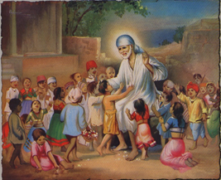By: Suresh Chandra Gupta
 When we read Sai Satcharita and read and re-read Sai Baba’s assurances, compared to the Draft by Thomas Jefferson, on America’s Declaration of Independence unwittingly we find a disservice when it uses the phrase, “life, liberty, and the pursuit of happiness”, the last four words being taken from the British philosopher, John Locke.
When we read Sai Satcharita and read and re-read Sai Baba’s assurances, compared to the Draft by Thomas Jefferson, on America’s Declaration of Independence unwittingly we find a disservice when it uses the phrase, “life, liberty, and the pursuit of happiness”, the last four words being taken from the British philosopher, John Locke.
To Locke and Jefferson, “the pursuit of happiness” was the freedom to choose the right path to gather Sai Baba’s blessings, which would enable us to lead fulfilling lives. This concept was borrowed from ancient Greek philosophy, and those Americans who worship did not mean a ceaseless quest for physical, material, or emotional gratification.
I’ll be happy when I get promoted. I’ll be happy when I get married. I’ll be happy when I get my own apartment. I’ll be happy when…
We come across this situation among Sai devotees visiting many places of Sai worship. It’s that “when” that is the problem; it implies a future tense, in both the grammatical sense of the term, and in the sense that this future happiness we seek makes us tense because the search for it implies that we do not possess it at present. Or, as Lewis Carroll puts it in Alice Through the Looking Glass, “The rule is, jam tomorrow and jam yesterday – but never jam today.”
Like the jam which represents it, happiness for most of us is something that needs to be “pursued
like a fugitive”, as Hari Vinayak Sathe has put it in Sai Satcharita.

In this endless pursuit of happiness, we create a sense of disaffection. We create the opposite of happiness; we create unhappiness. According to evolutionary science, perhaps our brains are hardwired to be in a constant state of discontent, a trick of survival handed down to us from our pre-human predecessors.
The primates from whom we are descended had to be on ceaseless guard against predators. Those who were complacent were easy prey, while those who were edgy and always in the stress-inducing “flight-or-fight” mode of vigilance were favored for survival and passed on their genetic disposition of discontent. With Baba’s blessings, we can opt for ‘Survival of the fittest’.
It is this restless discontent, this drive to achieve something better, something more, which created fire, the ‘Sudarshana Kala Chakra’ and our success in Space research. But it has also caused executives who drop dead due to stress. Hold on to Sai Maharaj you are safe.
When a poet was asked what his poem was about, the reply was that a poem is not about something other than itself. A rose is a rose, is a rose; a poem is a poem, is a poem. Are such statements a meaningless repetition of words? Is what we call happiness, like a rose, or a poem, not about something but is just itself, what the Sai devotees termed an “in-itself”?
Dasganu Maharaj would say that happiness results from total surrender to Sai Baba and detachment of desire. A concept echoed in the ego, free from the shackles of longing.
Like a mirage forever receding as it is approached, happiness eludes entrapment by its pursuer. The most elusive thing about happiness is that it’s an experience we might already be living without realizing it, so busy are we in quest of it.
Pursuit of happiness? Give it a break.

Leave a Reply